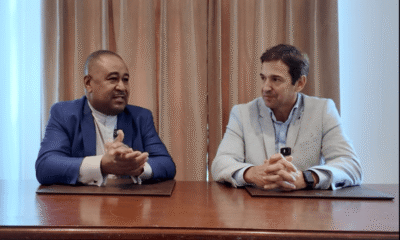“Neonazis:” Colombian Presidential Candidate Gustavo Petro Showing Demagogic Tendencies
Former guerilla and current leftist senator and Colombian presidential candidate Gustavo Petro has taken to calling journalists who question his policies, such as his promise to nationalize pension contributions under 4 million pesos per month “neonazis.”
The tweet is reminiscent of Russian dictator Vladimir Putin’s recent smear of Ukraine’s President Volodymyr Zelensky by calling the leader a “neonazi” for daring to oppose Putin, even though Zelensky is of Jewish heritage and has not professed any extremist ideology. In this case, Petro has now said RCN columnist David Ghitis is a “neonazi.” Ghitis is also of Jewish heritage. Ghitis simply pointed out correctly that Petro does plan, if elected president, to mandate new pension contributions on salaries under 4 million COP per month go exclusively to a government controlled fund. Currently, employees have a choice between several privately managed funds, or if they wish, a government fund.
Neo nazis en RCN. https://t.co/tYZzHF0Yaw
— Gustavo Petro (@petrogustavo) March 28, 2022
When Petro was the mayor of Bogotá, he attempted to take control of the city’s sanitation system from private contractors, leading to fiasco and public health crisis with garbage piling up on the streets in the city of 9 million. The debacle led to him temporarily being removed from office by the national government.
Petro is showing himself to be a demagogue like his late friend Hugo Chavez. He has stated his plan to take control of the food supply, reminiscent of neighboring Venezuela’s CLAP program, where the government controls distribution of food staples, releasing supplies only through ruling-party approved local bosses. By destroying the food supply chain, Venezuela’s ruling cabal has created a humanitarian crisis, with millions of hungry Venezuelans fleeing the country. Colombia now hosts approximately 2 million Venezuelan refugees.
See also: Colombian Presidential Candidate Gustavo Petro Promises To Nationalize Pensions, Bypass Congress & Rule By Decree If Elected
Petro has found himself in trouble for his proclivity to smear people as neonazis before. Petro was forced to issue a public correction against Venezuelan Lorent Sale, who Petro called a drug abuser, woman beater, and of course, neonazi. Threatened with a libel complaint, Petro tweeted: “In relation to the Venezuelan citizen Lorent Sale, there do not exist indications or proof, nor do I know that the sir has abused women under the effect of drugs the day he was retained by the National Police in the city of Cúcuta the 27th of February 2019.”
En relación con el ciudadano venezolano Lorent Sale, no existe indicio o prueba, ni me consta, que el señor haya abusado de mujeres bajo los efectos de drogas el día de su retención por parte de la Policía Nacional en la ciudad de Cúcuta el 27 de febrero de 2019.
— Gustavo Petro (@petrogustavo) March 23, 2022
Petro is a former member of the M19 armed communist group that among other crimes, kidnapped and murdered union leader José Raquel Mercado, attacked the embassy of the Dominican Republic in Colombia, and attacked Colombia’s supreme court, taking over 300 hostages in the 1980s, leading to several fatalities.
FLIP says Petro promotes violence
Colombia’s press freedom foundation, the FLIP (Fundación para la Libertad de Prensa) has condemned Petro’s stigmatizations and cautions that his careless words may lead to violence against journalists and columnists simply doing their job.
The nonpartisan FLIP has also been aggressive defending the work of journalists against right wing politicians. According to the Committee to Protect Journalists, 53 journalists and media workers have been killed in Colombia between 1992 and 2022.
Flip’s statement (translated):
FLIP categorically rejects the violence promoted by the presidential candidate Gustavo Petro against the RCN channel. On his Twitter account, this March 28, Petro published the message: “Neonazis in RCN,” referring to David Ghitis’ opinion column, titled “Petro wants to rob us.” These stigmatizations are not new, they seriously harm the freedom of the press and because they are repeated, they are interpreted as a smear campaign, for electoral purposes, against this medium.
The fact that the candidate compares his critics with an ideology that was behind a holocaust is clearly a stigmatization that imposes great symbolic and political burdens and that ends up reviving violence against the media. With this message, Petro promotes the image that RCN institutionally houses and disseminates fascist positions. In addition, he directly stigmatizes journalist David Ghitis, who expressed his opinions of him on the candidate’s pension fund proposal.
These remarks limit the electoral debate and promote self-censorship among journalists, which cannot be accepted in a democratic society, much less during elections. Rebuking critical voices about the candidacies harms the possibility that citizens receive information and vote freely. It is the duty of the candidates to respect the opinions that the journalists spread about them.
The candidates for the Presidency must understand that their speeches have repercussions in the electoral scenario, where there is an atmosphere of greater hostility against the press. His voice has a great echo among his followers and far from promoting violence, his messages are called to adopt a discourse favorable to public controversy, pluralism and deliberation.
Candidate Petro’s attacks against RCN have been repetitive. In different scenarios, he has launched stigmatizing messages against the media and has unfoundedly delegitimized his journalistic work, questioning the quality of the information, as well as his editorial line.
We warn that the attacks against the media and journalists are fueled by expressions of aversion by public figures who do not accept legitimate oversight of them. It should be remembered that the 2021 demonstrations were especially violent against the press, during the three months of the national strike there were 300 attacks on the press and, in particular, we highlight very serious attacks against the RCN channel.
Due to the above, we call on Gustavo Petro, as presidential candidate and political leader, to send a message of support for the journalistic exercise and to issue a public apology, which is in tune with the unconditional respect for freedom of the press. as a democratic pillar. FLIP will monitor and promote that violence against the press is not used in the electoral framework.
We warn that Colombia is going through one of the most acute public discussions in its recent history, so it is vital that political parties, as well as the National Electoral Council and the Attorney General’s Office guarantee the conditions for the free exercise of freedom of the press and of expression.
Media outlet RCN also denounced Petro in a statement, translated here:
At RCN news we repudiate the discourses of hate and stigmatizations for the infinite harm to the personal and moral integrity it causes. We reject the affirmations of Gustavo Petro, presidential candidate of the Historic Pact (political coalition) who in a tweet, utilized disqualifying expressions against the columnist David Ghitis and against us as a communications media, calling us “neonazis in RCN.”
This type of declaration puts at extreme risk those who raise their voices in exercise of freedom of the press and of expression.
The political leaders are subject to a higher scrutiny by society and have standards of responsibility and ethics higher than any other person. The tolerance against criticism is an unobjectionable support of democratic tolerance, and a legal charge that all responsible men and women of public causes carry with themselves, as sanctified by the Universal Declaration of Human Rights, the American Convention on Human Rights, and our Political Constitution of 1991.
We reiterate: Peoples’ lives are put in danger by these statements.
The public debate and the controversy with respect will always be desirable and welcome, stigmatizations, no!


























